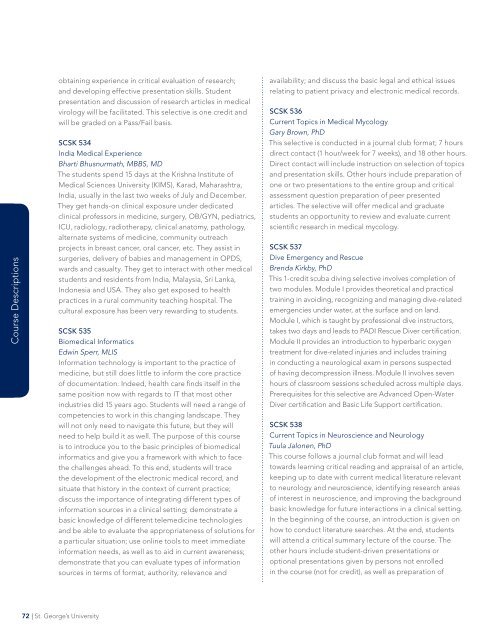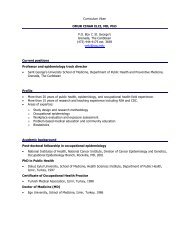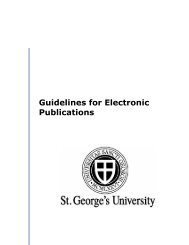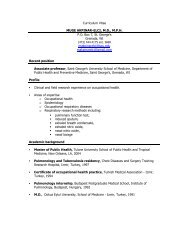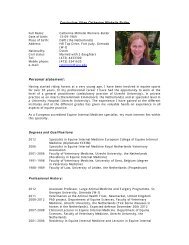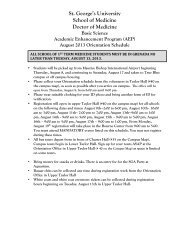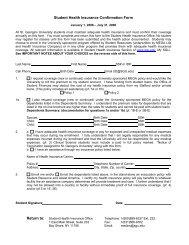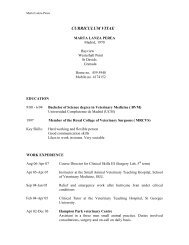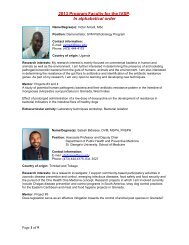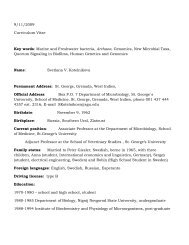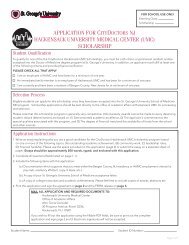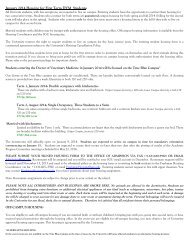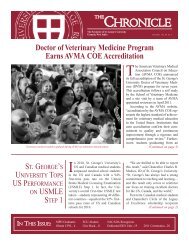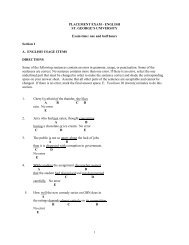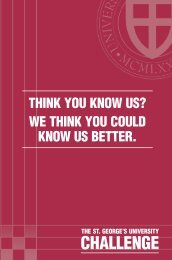SCHOOL OF 2012-2013 - St. George's University
SCHOOL OF 2012-2013 - St. George's University
SCHOOL OF 2012-2013 - St. George's University
You also want an ePaper? Increase the reach of your titles
YUMPU automatically turns print PDFs into web optimized ePapers that Google loves.
School of Medicine<br />
Course Descriptions<br />
obtaining experience in critical evaluation of research;<br />
and developing effective presentation skills. <strong>St</strong>udent<br />
presentation and discussion of research articles in medical<br />
virology will be facilitated. This selective is one credit and<br />
will be graded on a Pass/Fail basis.<br />
SCSK 534<br />
India Medical Experience<br />
Bharti Bhusnurmath, MBBS, MD<br />
The students spend 15 days at the Krishna Institute of<br />
Medical Sciences <strong>University</strong> (KIMS), Karad, Maharashtra,<br />
India, usually in the last two weeks of July and December.<br />
They get hands-on clinical exposure under dedicated<br />
clinical professors in medicine, surgery, OB/GYN, pediatrics,<br />
ICU, radiology, radiotherapy, clinical anatomy, pathology,<br />
alternate systems of medicine, community outreach<br />
projects in breast cancer, oral cancer, etc. They assist in<br />
surgeries, delivery of babies and management in OPDS,<br />
wards and casualty. They get to interact with other medical<br />
students and residents from India, Malaysia, Sri Lanka,<br />
Indonesia and USA. They also get exposed to health<br />
practices in a rural community teaching hospital. The<br />
cultural exposure has been very rewarding to students.<br />
SCSK 535<br />
Biomedical Informatics<br />
Edwin Sperr, MLIS<br />
Information technology is important to the practice of<br />
medicine, but still does little to inform the core practice<br />
of documentation. Indeed, health care finds itself in the<br />
same position now with regards to IT that most other<br />
industries did 15 years ago. <strong>St</strong>udents will need a range of<br />
competencies to work in this changing landscape. They<br />
will not only need to navigate this future, but they will<br />
need to help build it as well. The purpose of this course<br />
is to introduce you to the basic principles of biomedical<br />
informatics and give you a framework with which to face<br />
the challenges ahead. To this end, students will trace<br />
the development of the electronic medical record, and<br />
situate that history in the context of current practice;<br />
discuss the importance of integrating different types of<br />
information sources in a clinical setting; demonstrate a<br />
basic knowledge of different telemedicine technologies<br />
and be able to evaluate the appropriateness of solutions for<br />
a particular situation; use online tools to meet immediate<br />
information needs, as well as to aid in current awareness;<br />
demonstrate that you can evaluate types of information<br />
sources in terms of format, authority, relevance and<br />
availability; and discuss the basic legal and ethical issues<br />
relating to patient privacy and electronic medical records.<br />
SCSK 536<br />
Current Topics in Medical Mycology<br />
Gary Brown, PhD<br />
This selective is conducted in a journal club format; 7 hours<br />
direct contact (1 hour/week for 7 weeks), and 18 other hours.<br />
Direct contact will include instruction on selection of topics<br />
and presentation skills. Other hours include preparation of<br />
one or two presentations to the entire group and critical<br />
assessment question preparation of peer presented<br />
articles. The selective will offer medical and graduate<br />
students an opportunity to review and evaluate current<br />
scientific research in medical mycology.<br />
SCSK 537<br />
Dive Emergency and Rescue<br />
Brenda Kirkby, PhD<br />
This 1-credit scuba diving selective involves completion of<br />
two modules. Module I provides theoretical and practical<br />
training in avoiding, recognizing and managing dive-related<br />
emergencies under water, at the surface and on land.<br />
Module I, which is taught by professional dive instructors,<br />
takes two days and leads to PADI Rescue Diver certification.<br />
Module II provides an introduction to hyperbaric oxygen<br />
treatment for dive-related injuries and includes training<br />
in conducting a neurological exam in persons suspected<br />
of having decompression illness. Module II involves seven<br />
hours of classroom sessions scheduled across multiple days.<br />
Prerequisites for this selective are Advanced Open-Water<br />
Diver certification and Basic Life Support certification.<br />
SCSK 538<br />
Current Topics in Neuroscience and Neurology<br />
Tuula Jalonen, PhD<br />
This course follows a journal club format and will lead<br />
towards learning critical reading and appraisal of an article,<br />
keeping up to date with current medical literature relevant<br />
to neurology and neuroscience, identifying research areas<br />
of interest in neuroscience, and improving the background<br />
basic knowledge for future interactions in a clinical setting.<br />
In the beginning of the course, an introduction is given on<br />
how to conduct literature searches. At the end, students<br />
will attend a critical summary lecture of the course. The<br />
other hours include student-driven presentations or<br />
optional presentations given by persons not enrolled<br />
in the course (not for credit), as well as preparation of<br />
72 | <strong>St</strong>. George’s <strong>University</strong>


